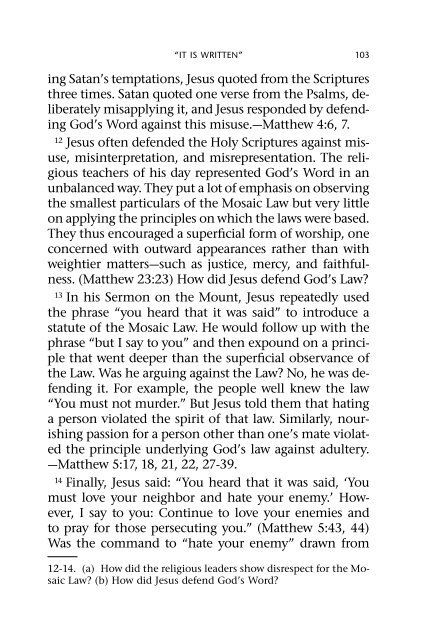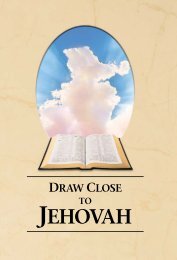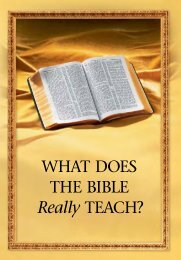Come Be My Follower - Jehovah's Witnesses Official Media Web Site
Come Be My Follower - Jehovah's Witnesses Official Media Web Site
Come Be My Follower - Jehovah's Witnesses Official Media Web Site
You also want an ePaper? Increase the reach of your titles
YUMPU automatically turns print PDFs into web optimized ePapers that Google loves.
“IT IS WRITTEN” 103<br />
ing Satan’s temptations, Jesus quoted from the Scriptures<br />
three times. Satan quoted one verse from the Psalms, deliberately<br />
misapplying it, and Jesus responded by defending<br />
God’s Word against this misuse.—Matthew 4:6, 7.<br />
12 Jesus often defended the Holy Scriptures against misuse,<br />
misinterpretation, and misrepresentation. The religious<br />
teachers of his day represented God’s Word in an<br />
unbalanced way. They put a lot of emphasis on observing<br />
the smallest particulars of the Mosaic Law but very little<br />
on applying the principles on which the laws were based.<br />
They thus encouraged a superficial form of worship, one<br />
concerned with outward appearances rather than with<br />
weightier matters—such as justice, mercy, and faithfulness.<br />
(Matthew 23:23) How did Jesus defend God’s Law?<br />
13 In his Sermon on the Mount, Jesus repeatedly used<br />
the phrase “you heard that it was said” to introduce a<br />
statute of the Mosaic Law. He would follow up with the<br />
phrase “but I say to you” and then expound on a principle<br />
that went deeper than the superficial observance of<br />
the Law. Was he arguing against the Law? No, he was defending<br />
it. For example, the people well knew the law<br />
“You must not murder.” But Jesus told them that hating<br />
a person violated the spirit of that law. Similarly, nourishing<br />
passion for a person other than one’s mate violated<br />
the principle underlying God’s law against adultery.<br />
—Matthew 5:17, 18, 21, 22, 27-39.<br />
14 Finally, Jesus said: “You heard that it was said, ‘You<br />
must love your neighbor and hate your enemy.’ However,<br />
I say to you: Continue to love your enemies and<br />
to pray for those persecuting you.” (Matthew 5:43, 44)<br />
Was the command to “hate your enemy” drawn from<br />
12-14. (a) How did the religious leaders show disrespect for the Mosaic<br />
Law? (b) How did Jesus defend God’s Word?






